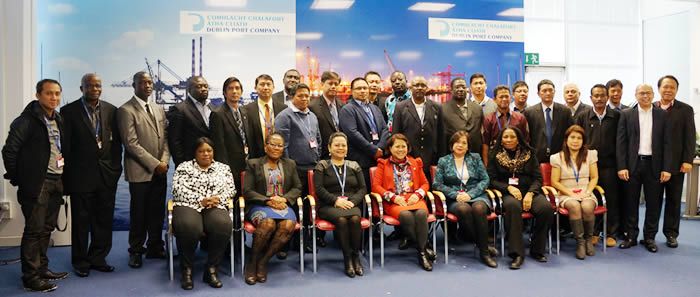Earlier this month, 30 senior port managers completed UNCTAD training as local instructors for the English-speaking network of its TrainForTrade Port Training Programme. The newly trained managers will now be responsible for assisting UNCTAD in delivering the Modern Port Management course in their respective ports in Ghana, Indonesia, Nigeria and the Philippines.
Thirty senior port managers from Ghana, Indonesia, Nigeria and the Philippines have completed an UNCTAD training workshop in Dublin, Ireland so that they can become local instructors for the TrainForTrade Port Training Programme in their respective countries.
During the workshop, which ran from 25 March to 4 April 2014, UNCTAD specialists and core instructors of the programme trained participants to deliver course content, lead group exercises, assess test results and provide feedback. Their abilities as instructors were assessed through individual and group assignments.

This was the first time senior port managers in Nigeria and the Philippines had attended such a workshop since these countries have only recently joined the UNCTAD programme. For the participating ports in Ghana and Indonesia, however, this was the fifth training-of-trainers workshop, having been members of the programme since 2008 and previously completing two training cycles. During the past training cycle in these two countries (2011-2013), the pool of certified instructors (22 in Ghana and 39 in Indonesia) delivered 50 % of the training modules.
 This training has given me the confidence to deliver different topics of the course and, as the training manager for Tema Port, I am now in a better position to identify the training needs of our operations staff This training has given me the confidence to deliver different topics of the course and, as the training manager for Tema Port, I am now in a better position to identify the training needs of our operations staff  Rejoice Anane, Training Manager, Tema Port, Ghana Ports and Harbours Authority |
The uniqueness and strength of the TrainForTrade Port Training Programme lies in its ability to foster local ownership, which reinforces the training's impact and ensures the programme's sustainability.
Local ownership of the programme is achieved through a financing scheme that requires the participating ports to provide the majority of the programme's funds, and by gradually shifting responsibility for implementing the programme from UNCTAD to the participating ports.
 The clear insight gained from the training and the interaction with other participants makes me determined to share this knowledge with my Port Authority, and contribute to the development of Nigerian ports The clear insight gained from the training and the interaction with other participants makes me determined to share this knowledge with my Port Authority, and contribute to the development of Nigerian ports  Stanley Yitnoe, Senior Manager, Operations, Nigerian Ports Authority. |
During the first cycle of the programme in any given port, UNCTAD sends an experienced trainer to lead eight training modules (each training cycle lasts 16 to 24 months and comprises 240 hours of in-class training and a final thesis). These international instructors are assisted by local senior managers who have already completed the training-of-trainers workshop. During the second cycle, however, the trained local instructors take the lead and deliver half of the training modules on their own. With each consecutive cycle, the local instructors take on more responsibility.
In many of the participating ports in French-speaking Africa, where the programme has been implemented since 1996, local instructors now deliver 75 % of the training modules. This is the case, for example, in the ports of Cotonou in Benin, Douala in Cameroon and Dakar in Senegal. UNCTAD aims to replicate this experience in the participating ports of Ghana, Indonesia, Nigeria and Indonesia.
The workshop was organized in collaboration with Dublin Port Company, with support from Irish Aid, the Port of Cork, Belfast Harbour Commissioners and Drogheda Port Company.


